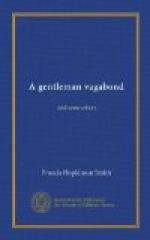“’Do not go to Berlin. Please come to Cracow with me. Think. I am alone, absolutely alone. My house is in order, and has been for months, expecting me every day. It is so terrible to go back; come with me, please.’
“’I must not, madame. I have promised my friends to be in Berlin in two days. I would, you know, sacrifice anything of my own to serve you.’
“‘And you will not?’ and a sigh of disappointment escaped her.
“‘I cannot.’
“’No; I must not ask you. You are right. It is better that you keep your word.’
“She continued walking, gazing still on the floor. Then she moved to the mantel, and touched a bell. Instantly the curtains of the door divided, and Polaff stood before her.
“‘Bring me my jewel-case.’
“The man bowed gravely, looked at me furtively from the corner of his eye, and closed the curtains behind him. In a moment he returned, bearing a large, morocco-covered box, which he placed on the table. She pressed the spring, and the lid flew up, uncovering several velvet-lined trays filled with jewels that flashed under the lighted candles.
“‘You need not wait, Polaff. You can go to bed.’
“The man stepped back a pace, stood by the wall, fixed his eye upon his mistress, as if about to speak, looked at me curiously, then, bowing low, drew the curtains aside, and closed the door behind him.
“Another spring, and out came a great string of pearls, a necklace of sapphires, some rubies, and emeralds. These she heaped up upon the white cloth beside her. Carefully examining the contents of the case, she drew from a lower tray a bracelet set with costly diamonds, a rare and beautiful ornament, and before I was aware of her intent had clasped it upon my wrist.
“’I want you to wear this for me. You see it is large enough to go quite up the arm.”
“For a moment my astonishment was so great I could not speak. Then I loosened it and laid it in her hand again. She looked up, her eyes filling, her face expressive of the deepest pain.
“‘And you will not?’
“’I cannot, madame. In my country men do not accept such costly presents from women, and then we do not wear bracelets, as your men do here.’
“‘Then take this case, and choose for yourself.’
“I poured the contents of a small tray into my hand, and picked out a plain locket, almond-shaped, simply wrought, with an opening on one side for hair.
“‘Give me this with your hair.’
“She threw the bracelet into the case, and her eyes lighted up.
“’Oh, I am so glad, so glad! It was mine when I was a child,—my mother gave it to me. The dear little locket—yes; you shall always wear it.’
“Then, rising from her seat, she took my hands in hers, and, looking down into my face, said, her voice breaking:—
“’It is eleven o’clock. Soon you must leave me. You cannot stay longer. I know that in a few hours I shall never see you again. Will you join me in my prayers before I go?’




